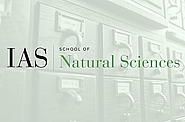Astrophysics Seminars
May
11
2023
Institute for Advanced Study Astrophysics Seminar
On the Galactic Center black hole and its multiphase environment
11:00am|Bloomberg Lecture Hall
May
04
2023
Institute for Advanced Study Astrophysics Seminar
Migration of Low-mass Planets in Dusty Protoplanetary Disks
11:00am|Bloomberg Lecture Hall
Apr
27
2023
Institute for Advanced Study Astrophysics Seminar
The colourful past and dark side of galaxies unveiled through population-dynamics of their stars
Glenn van de Ven
11:00am|Bloomberg Lecture Hall
Apr
20
2023
Institute for Advanced Study Astrophysics Seminar
Our Galaxy in motion: Ripples, ridges and spirals in the Milky Way
Jason Hunt
11:00am|Bloomberg Lecture Hall
Apr
13
2023
Institute for Advanced Study Astrophysics Seminar
Shapes of non-Gaussianity in warm inflation
11:00am|Bloomberg Lecture Hall
Apr
06
2023
Institute for Advanced Study Astrophysics Seminar
Weak lensing without shape noise
Elisabeth Krause
11:00am|Bloomberg Lecture Hall
Mar
30
2023
Institute for Advanced Study Astrophysics Seminar
Exploring galactic nuclei with tidal disruption events
Brenna Mockler
11:00am|Bloomberg Lecture Hall
Mar
23
2023
Institute for Advanced Study Astrophysics Seminar
Model-Independent Constraints on Dark Matter and Cosmic Neutrino Profiles with Ultra-Precision Astrometry
Yu-Dai Tsai
11:00am|Bloomberg Lecture Hall
Mar
16
2023
Institute for Advanced Study Astrophysics Seminar
Processes of Stellar Destruction in Galactic Nuclei and Quasi-Periodic X-Ray Eruptions
11:00am|Bloomberg Lecture Hall
Mar
10
2023
Institute for Advanced Study Astrophysics Seminar
Stellar Streams as Probes of Galactic Structure and Dark Matter Halos
11:00am|Bloomberg Lecture Hall
